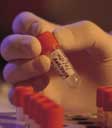 A
fighting chance This isn't the same as a cure, but it's a start. Typically, patients who respond to radioimmunotherapy live two to three years longer before they relapse. But those who don't respond to the antibody die within weeks. And there are success stories. Grant Huntington, 65, received radioimmunotherapy for advanced lymphoma in 1990. He was one of the DeNardo's first patients. He has relapsed before but controls the disease with medication and aggressive follow up, much as does any person with a chronic disease. "I have my good days and my bad days, but I have four grandchildren in my life I otherwise would have not lived to see," said the Granite Bay resident. "I'm very grateful." Blasucci hopes he'll have similar results. From February to September 1999, he received five doses of radioimmunotherapy administered in six week intervals. Blasucci commuted between his Oceanside, New York home and Sacramento for treatment. Bicoastal patients are not new to the program; patients have come to the program from across the U.S. and Canada. As is typically the case, Blasucci had few side effects and was able to work throughout his treatment.
Home |
Table of Contents |
To our Readers |
Building on Basics UC Davis Health System | © 2000, 2001, 2002 UC Regents. All rights reserved. |
 |
